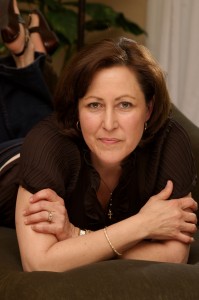CSUN Prof’s New Poetry Collection Offers Brutal Look at America’s Growing Acculturation of Violence

Dorothy Barresi
The poems in “What We Did While We Made More Guns” by California State University, Northridge English professor Dorothy Barresi are a brutally honest excoriation of what happened to America’s soul during the last economic downturn.
The book of poetry, released this month by University of Pittsburgh Press, and featured recently in an article on PBS “NewsHour” online, reflects on how America’s more recent economic failures inspired a sense of anxiousness and moral uncertainty in many of its citizens.
“One of the themes in my book is economic failure and its relationship to gun violence in America,” Barresi said. “There’s a thread of death running through the book and a thread of scorned indignation about the expectations for a kind of American security, a financial security, that undercuts our very purpose and identity, and how that can lead to a violent individualism.”
Many of the poems seem prescient, as if Barresi wrote them in the past few months, inspired by the political turmoil and outrage currently affecting much of the country. She insists she started putting words to paper eight years ago, as America’s citizens grappled with the fallout of the Great Recession.
“I grew up in Akron, Ohio, when that city was dying in the 1970s as the rubber tire industry moved its factories overseas or to non-union cities down South,” said Barresi. “Stores were closing and the downtown was boarded up, and thousands of people were left bereft. The stump-speech idea, in 2016, that manufacturing and mining jobs were coming back just hurt my heart. Those jobs are not coming back, and those folks in Middle America rightly feel that they are being overlooked.”
The poems in “What We Did While We Made More Guns” reflect the frustration and anger many Americans felt as they saw their way of life disappear and found themselves looking for someone or something to blame.
“Everyone, not just ‘blue-collar’ workers, got a huge wake-up call with the Great Recession,” Barresi said. “Retirement savings and pensions and job security were lost, and nothing was offered to take their place. America was, and still is, in a kind of spiritual free fall. We’re living post-American dream. My poems explore that free fall, the indignation and the extreme beliefs that rush in to fill the void: permission to believe anything as long as you believe it passionately. The facts don’t matter.”
“As for my having a finger on the pulse of what is happening right this moment in America,” she said, “the high school shooting in Parkland and the NRA’s response to the student-led campaign for stricter gun laws, or the neo-Nazi rally in Virginia, for that matter, or the ongoing war on immigrants — that wouldn’t have to be a very long finger, sadly.”
Time passes, Barresi said, but the concerns and frustrations of Americans remain. She pointed out that she also wrote about gun violence and extreme beliefs in earlier poetry collections, particularly in “American Fanatics,” published in 2010, as well as in “Rouge Pulp,” “The Post-Rapture Dinner,” winner of an American Book Award, and “All of the Above,” winner of the Barnard College New Women Poets Prize.
In the wake of the spate of mass shootings over the past few months, the poem “What We Did While We Made More Guns” seems particularly timely, though it was written several years ago. Another poem, “L.A.P.D.,” was inspired by incidents of police-involved shootings.
Barresi said she keeps a journal in which she writes down the titles — drawn from news articles she’s seen or snippets of conversations she’s overheard — for future poems she doesn’t even know the words for yet. Her poem “National Public Radio,” was inspired by a report on torture she heard on the network’s news program.
“I just read the paper every day and try to be as informed as possible,” she said. “The hardest thing is to try to step outside one’s self a little bit and try to connect with what is happening with others. That’s my goal.”
In addition to Americans’ frustrations, her poems reflect on the country’s loss of moral certainty; the contradictions of American expectations; the poignancy, fragility and inconsistency of our lives; and how all those things are interconnected.
“I like to reflect outward,” Barresi said. “I think the public and private are absolutely entwined.”

 experience
experience